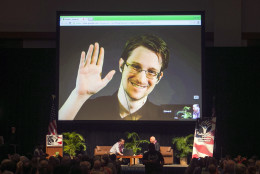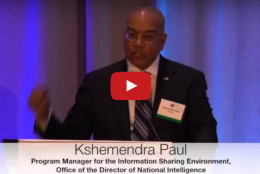Hubbard Radio Washington DC, LLC. All rights reserved. This website is not intended for users located within the European Economic Area.
On Air: Federal News Network
INSA
-
Current and former counterintelligence officials say there is no known evidence so far that a victim of the Office of Personnel Management's cyber breaches has been specifically targeted. Instead, the public's loss of trust in OPM and government as a whole has been the biggest damage done after the breaches.
April 11, 2017 -
Federal employees and contractors waited hundreds of days in some cases for a security clearance in 2016, but the Office of Personnel Management spent much of the year putting the policy pieces in place for improvement. Key stakeholders in the Performance Accountability Council developed an IT plan for the new background investigation system and issued business rules for adjudicating some cases.
December 27, 2016 -
Experts say until the government moves to a continuous evaluation program of employees and contractors with clearances, threats from employees will continue to grow.
October 17, 2016 -
Agencies will know later this month how much more they will have to pay for security clearances to the National Background Investigations Bureau. The NBIB will meet initial operating capability on Oct. 1 and begin processing all security clearance cases.
September 07, 2016 -
The Homeland Security Department’s newest pilot program puts employees on detail within industry offices. The goal is for the employees to gain experience within the private sector on topics like cybersecurity, and bring that knowledge back to the government, while also strengthening collaboration with industry
June 27, 2016 -
Current and former intelligence community officials say they're not getting the buy-in they need from their top leadership — or the guidance they need to use begin using social media — in their insider threat and security clearance programs.
April 28, 2016 -
The Federal government’s security clearance system is outdated and needs to be replaced, but fixing it is going to take time because the government is still years away from fully developing a continuous evaluation process that can replace today’s once-every-five-years investigations.
January 29, 2016 -
The Intelligence and National Security Alliance convened a breakfast forum to host the panel discussion, “Virtualization in Collaborative Information Sharing Environment” to discuss the benefits of virtualization and how the public and private sectors can best work together to share information.
November 30, 2015 -
Responding to cyber penetrations into federal IT systems at the Office of Personnel Management and elsewhere, the Office of the Director of National Intelligence said Wednesday that it was launching a “comprehensive” and governmentwide counterintelligence campaign.
September 10, 2015 -
Contractors, government relationship feeling the impact of cutting-edge technology, resulting in potentially cheaper and more efficient manufacturing.
September 01, 2015 -
The Intelligence Community may be in the same personnel spot the Defense Department is in for the same reason. The IC needs to find a way to shrink its workforce but still meet its mission. Marshall Keith, former vice president of Enterprise Operations at SI Organization, is now a principal at the Intelligence and National Security Alliance for its Task Force Research and Writing Team. He tells In Depth with Francis Rose INSA is arguing intelligence agencies could take a few pages from the Defense Department's sequestration playbook as it focuses on its future workforce needs.
May 13, 2014 -
Agencies and universities are refining job descriptions, revamping training and education programs and helping industry, academia and government to begin to reach consensus on the makeup of a modern-day cybersecurity workforce. The Office of Personnel Management also has made changes to personnel systems so that job descriptions map to the framework. The plan already has had in impact on cyber education at colleges and universities across the country.
October 08, 2012 -
The Energy and Homeland Security departments are working with companies in the electricity sector to come up with a baseline set of cybersecurity standards. Michael Daniel, the White House cyber coordinator, said the framework is making a difference in how owners and operators secure their networks. But Rep. Mike Rogers (R-Mich.) said without liability protections expansion of these efforts isn't likely.
September 27, 2012 -
Intelligence community observer Ellen McCarthy says massive across-the-board spending cuts would result in significant layoffs in both the federal government and the private sector.
August 13, 2012













